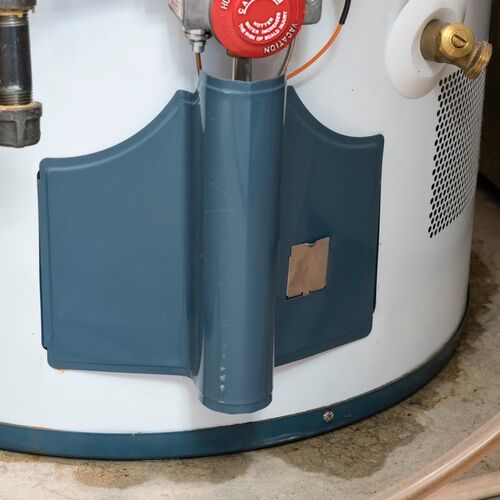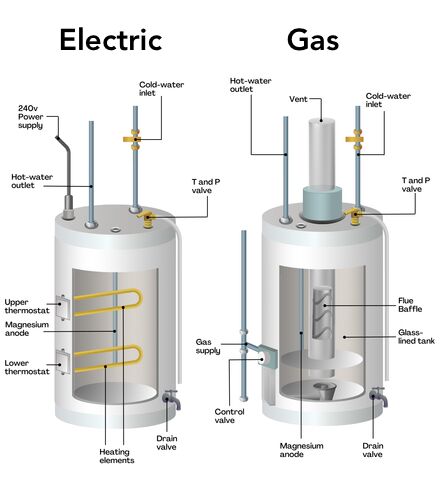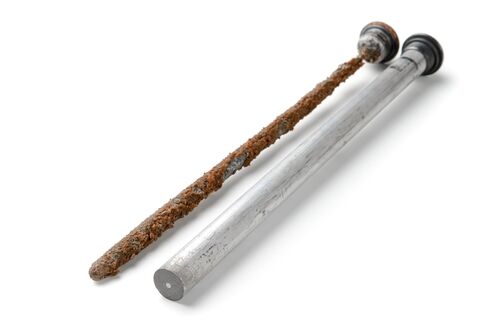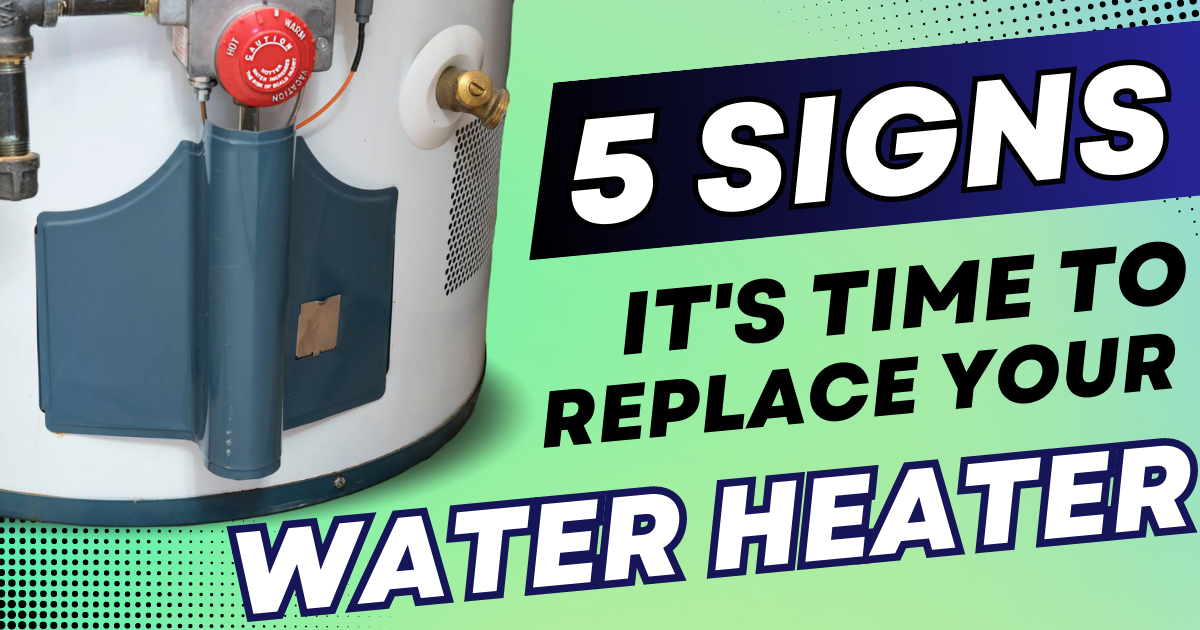
Your trusty tank water heater has faithfully provided sizzling water to your family for years, perhaps too a few years. And similar to all home equipment, it has a restricted lifespan. It isn’t immortal. Understanding that key level is a matter many individuals appear to overlook, however overlook it at your individual peril as a result of when water heaters fail, the failure is commonly spectacular and costly.
There are at all times indicators that failure is imminent. Studying what to search for is the important thing to know when to exchange your water heater as a result of you must change it earlier than it fails to keep away from an costly mess. Let’s dive into the 5 indicators it’s time to exchange your water heater, however first we have to perceive why water heaters fail.
Why Water Heaters Fail
Tank water heaters can fail because of varied causes, together with pure put on and tear, growing older parts, lack of upkeep, and exterior elements. A few of the most typical failure factors in tank water heaters are:
- Sediment Buildup: Over time, minerals and sediment within the water provide can settle on the backside of the tank. This sediment buildup may cause the tank to overheat, resulting in decreased effectivity and probably damaging the heating parts or burner. In case you’ve obtained onerous water in your space this could be a large downside on your water heater.
- Corrosion: The metallic parts contained in the tank can corrode over time, particularly if the anode rod (a sacrificial rod that pulls corrosive parts) shouldn’t be changed recurrently. Corrosion weakens the tank, making it inclined to leaks and eventual failure.
- Leaking Stress Aid Valve: The strain aid valve is a security function that releases extra strain from the tank. If the valve turns into defective or begins leaking, it can lead to improper strain regulation, compromising the security and performance of the water heater.
- Failed Heating Ingredient: Electrical water heaters have heating parts that warmth the water. These heating parts can fail because of age, sediment buildup, corrosion, or electrical points. A failed heating factor will lead to insufficient sizzling water provide or no sizzling water in any respect.
- Gasoline Management Valve Points: Gasoline water heaters have a management valve that regulates the movement of gasoline to the burner. Malfunctions within the gasoline management valve may cause issues with gasoline provide, combustion, and pilot gentle ignition, resulting in a scarcity of sizzling water or inefficient heating.
- Defective or Malfunctioning Thermostat: The thermostat controls the temperature of the water within the tank. A defective thermostat can lead to inconsistent water temperatures and an indignant spouse.
#1 Previous Age
The age of your water heater is truthfully the largest issue to contemplate. In case your tank water heater is reaching or exceeding its anticipated lifespan, it’s time to start out purchasing for alternative. It doesn’t matter in case your water heater is gasoline or electrical, the normal tank water heater has a lifespan of between 8-12 years earlier than it dies a tragic and messy loss of life.
Verify the label in your water heater see the manufacture date. It might be listed as a part of the serial quantity in coded format, so except the date is clearly listed it’s finest to easily Google one thing like “Find out how to discover producer date of [your brand] water heater”
As soon as your water heater reaches 8 years previous it’s time to start out watching it very carefully for a few of these different indicators under. If it’s already previous 12 years previous I might simply plan to get a brand new one…right this moment!
#2 Rust and Corrosion
A tank water heater is basically an enormous metallic tub that holds water day by day all day. In addition to these items are constructed it’s only a matter of time earlier than the metallic components begin to corrode. Over time, the metallic parts contained in the tank can deteriorate, resulting in leaks and potential water harm. In case you discover rusty water coming out of your taps or seen indicators of corrosion on the tank itself, it’s a transparent indication that your water heater is nearing the tip of its life.
Don’t simply look on the tank itself, but additionally verify the weather and pipes above and under the water heater. Someday installers mistakenly use connections with dissimilar metals that trigger galvanic corrosion ensuing is untimely failure. In case you see indicators of rust or corrosion wherever it might be time to restore or change that merchandise or the entire water heater relying on the realm of corrosion.
#3 Unusual Noises
This will likely sound bizarre, however I can guarantee you from private expertise that this can be a certain signal of impending doom. Uncommon sounds coming out of your water heater, comparable to rumbling, banging, or popping noises, can point out sediment buildup. Extreme sediment impacts the heater’s effectivity and may trigger irreversible harm. If flushing the tank (see under) doesn’t resolve the difficulty, it might be time for a alternative.
#4 Inadequate Scorching Water
In case you persistently expertise a scarcity of sizzling water or discover a lower in water temperature, your thermostat could also be failing which may be simply changed on most fashions, or it might be an indication of a bigger concern indicating your water heater could be on its final leg. As models age, they could battle to keep up the specified water temperature because of put on and tear. If this concern persists regardless of correct upkeep, it’s doubtless time to spend money on a brand new water heater.
#5 Leaks and Moisture
Water pooling across the base of your water heater or seen leaks are crimson flags that demand fast consideration. Even small leaks can escalate shortly, inflicting important water harm to your private home. A small leak within the morning can lead to a catastrophic failure by lunchtime so don’t hesitate.
Tank water heaters have a drip pan under them to catch minor leaks, however that pan is not going to maintain the complete 60 gallons of water contained in the tank. In case you see standing water within the pan or indicators of rust or dried water marks from previous leaks then it might be time for alternative particularly in case your water heater is on the older aspect.
Water Heater Upkeep
How are you going to lengthen the years earlier than you must change your water heater? Common upkeep! It performs a significant factor in how lengthy your water heater lasts. Neglecting any sort of upkeep will imply you’ll be changing it early and infrequently; whereas maintaining with what’s required can purchase you years of trustworthy service. Right here’s a fast breakdown of what you have to be doing to keep up your water heater.

Flush the Tank
Sediment buildup can have an effect on the effectivity of your water heater. Flushing the tank yearly or each six months (relying on water hardness) helps take away amassed sediment. Right here’s easy methods to do it:
- Flip off the facility provide (for electrical heaters) or set the gasoline management valve to pilot (for gasoline heaters).
- Connect a hose to the drain valve on the backside of the tank and place the opposite finish in an acceptable drainage space.
- Open the drain valve and permit the water to movement out till it runs clear, indicating sediment elimination.
- Shut the drain valve, take away the hose, and restore the facility provide or gasoline management valve.
Change Anode Rod
The anode rod helps forestall tank corrosion by attracting corrosive parts. Examine the anode rod yearly and take into account alternative whether it is closely corroded, sometimes each 3-5 years. Observe these steps:

- Flip off the facility provide (for electrical heaters) or set the gasoline management valve to pilot (for gasoline heaters).
- Find the anode rod’s entry level on the highest of the tank and use a socket wrench to take away it.
- Examine the rod’s situation: whether it is closely corroded or lower than 1/2 inch thick, change it with a brand new anode rod of the identical kind and dimension.
- Apply teflon tape on the threads of the brand new anode rod and set up it within the tank.
- Restore the facility provide or gasoline management valve.
Verify Stress Aid Valve
The strain aid valve ensures the protected operation of the water heater. Take a look at it yearly to confirm correct functioning:
- Flip off the facility provide (for electrical heaters) or set the gasoline management valve to pilot (for gasoline heaters).
- Find the strain aid valve on the aspect or high of the tank.
- Place a bucket below the valve to catch any launched water.
- Carry the valve’s lever or twist the take a look at knob to open it momentarily. Scorching water ought to discharge forcefully into the bucket.
- If the valve fails to launch water, it might be defective and requires alternative. Seek the advice of knowledgeable plumber if that’s the case.
With water heaters it’s finest to not threat it. The price of a brand new water heater pales compared to the harm they’ll create, particularly if they’re inside the house or upstairs the place water can cascade all through the home. In case your water heater is in an unfinished storage or basement then perhaps you could be a bit extra cavalier together with your alternative schedule, however keep in mind you’ll nonetheless be with out sizzling water as soon as it fails till you may get it changed.
Hopefully you are feeling higher ready to to know when to exchange your water heater after this put up. In case you occur to have an ideal water heater story please share it under within the feedback. I’d love to listen to from you!
Subscribe Now For Your FREE eBook!

Founder & Editor-in-Chief
I like previous homes, working with my fingers, and educating others the excitment of doing it your self! Every part is teachable when you solely give it the prospect.

